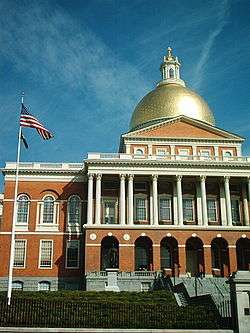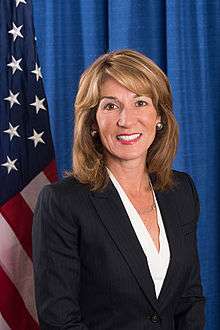Government of Massachusetts

The form of Massachusetts government is provided by the Constitution of the Commonwealth. The legislative power is exercised by the bicameral General Court, composed of the Senate and House of Representatives. The executive power generally is exercised by the Governor, along with other independently elected officers, the Attorney General, Secretary of the Commonwealth, and Auditor. The judicial power is reposed in the Supreme Judicial Court, which superintends the entire system of courts. Cities and towns also act through local governmental bodies that possess only the authority granted to them by the Commonwealth over local issues, including limited home rule authority. Most county governments were abolished in the 1990s and 2000s, although a handful remain.
The capital of Massachusetts is Boston. The seat of power is Beacon Hill, which is home to the legislative and executive branches. The Supreme Judicial Court occupies nearby Pemberton Hill.
Executive
There are 151 departments or agencies in Massachusetts, and over 700 independent boards and commissions.[1] The Governor exercises direct control over many of the largest agencies, but only indirect control over independent entities through appointments.
Elected officials
The statewide elected officials are:
|
Other elected officials are:
- Massachusetts Governor's Council Elected every two years
- District attorneys - Independently elected by district
- Sheriffs - Independently elected by district
Some executive agencies are delegated by the legislature with the responsibility of formulating regulations by following a prescribed procedure. Most of these are collected in the Code of Massachusetts Regulations.
Governor's cabinet
The governor has a cabinet of ten secretaries.[2] In general, they supervise the state agencies which are under the direct control of the governor.[3] Eight of the secretaries preside over the "Executive Office of" their respective areas.[4]
|
|
Legislature

The state legislature is formally known as the General Court, reflecting its former judicial duties in the colonial era. It is composed of two houses: the Massachusetts Senate, which has 40 members, and the Massachusetts House of Representatives, which has 160 members. All members in both houses face election every two years. The Speaker of the Massachusetts House of Representatives presides over the House of Representatives, is its chief leader, and controls the flow of legislation. The President of the Massachusetts Senate is the presiding officer of the Senate.
The General Court is responsible for enacting laws in the state. A bill signed by the governor, or passed by two-thirds of both branches over his veto, becomes a law. Its session laws are published in the official Acts and Resolves of Massachusetts, which are codified as the General Laws of Massachusetts.
Judiciary
The judiciary of Massachusetts is the branch of the government that interprets and applies the law of Massachusetts, ensures equal justice under law, and provides a mechanism for dispute resolution. The Massachusetts court system consists of the Supreme Judicial Court, the Appeals Court, and the seven Trial Court departments:
- Superior Court
- District Court
- Land Court
- Housing Court
- Juvenile Court
- Probate and Family Court
- Boston Municipal Court
The judicial power in Massachusetts is reposed in the Supreme Judicial Court, which superintends the entire system of courts. In addition to appellate functions, the Supreme Judicial Court is responsible for the general superintendence of the judiciary and of the bar, makes or approves rules for the operations of all the courts, and in certain instances, provides advisory opinions, upon request, to the Governor and Legislature on various legal issues. The Supreme Judicial Court also oversees several affiliated agencies of the judicial branch, including the Board of Bar Overseers, the Board of Bar Examiners, the Clients' Security Board, the Massachusetts Mental Health Legal Advisors Committee, and Massachusetts Correctional Legal Services.
Local government
Massachusetts shares with the five other New England states a governmental structure known as the New England town. Only the southeastern third of the state has functioning county governments; in western, central, and northeastern Massachusetts, traditional county-level government was eliminated in the late 1990s. All of the land in Massachusetts is divided up among the cities and towns and there are no "unincorporated" areas or population centers, nor townships. Generally speaking, there are four kinds of public school districts in Massachusetts: local schools, regional schools, vocational/technical schools, and charter schools. District attorneys and sheriffs are elected by constituencies that mostly, but not entirely, follow county boundaries; they are funded by the state budget.[8][9] Though most county governments have been abolished, each county still has a Sheriff's Department which operates jails and correctional facilities and service of process within the county.
Transparency
The state has an Open Meeting Law, enforced by the Attorney General, and a Public Records Law, enforced by the Secretary of the Commonwealth.[10] A 2008 report by the Better Government Association and National Freedom of Information Coalition ranked Massachusetts 43rd out of 50 states for government transparency, and gave it a failing grade of "F" taking into account time, cost, and comprehensiveness of access to public records.[11][12] Access to government records and the actions of the Secretary in enforcing the law became an issue in the 2014 campaign for the office. Incumbent William Galvin cited his previous requests that the legislature revise the Public Records Law to make access easier.[13] The governor claims to be exempt from the Public Records Law.[10]
A reform law was signed on June 3, 2016, which will take effect on January 1, 2017, putting stricter limits on time and reducing costs.[14]
See also
- Law enforcement in Massachusetts
- Law of Massachusetts
- Open standards in Massachusetts
- Politics of Massachusetts
References
- ↑ http://appointments.state.ma.us/Default.aspx
- ↑ http://www.mass.gov/?pageID=gov3subtopic&L=3&L0=Home&L1=Our+Team&L2=Cabinet&sid=Agov3
- ↑ "State Government Organizational Chart - Commonwealth of Massachusetts". mass.gov.
- ↑ 6A MGL 2
- ↑ "General Laws". mass.gov.
- ↑ 7A MGL 1
- 1 2 6A MGL 16
- ↑ "FY2009 Budget - District Attorneys General Appropriations Act". mass.gov.
- ↑ "FY2009 Budget - Sheriffs General Appropriations Act". mass.gov.
- 1 2 "FOREWORD". rcfp.org.
- ↑ http://www.nfoic.org/sites/default/files/results1.pdf
- ↑ "States Failing FOI Responsiveness". nfoic.org.
- ↑ "Secretary of State Galvin faces criticism for keeping government secrets - Metro - The Boston Globe". BostonGlobe.com.
- ↑ http://www.wbur.org/2016/06/03/baker-public-records
Further reading
- Organizational structure of the Government
- Center for Public Integrity; Global Integrity; Public Radio International (2011). "Massachusetts". State Integrity Investigation: Keeping Government Honest. USA.
External links
| Wikimedia Commons has media related to Government of Massachusetts. |



.png)



